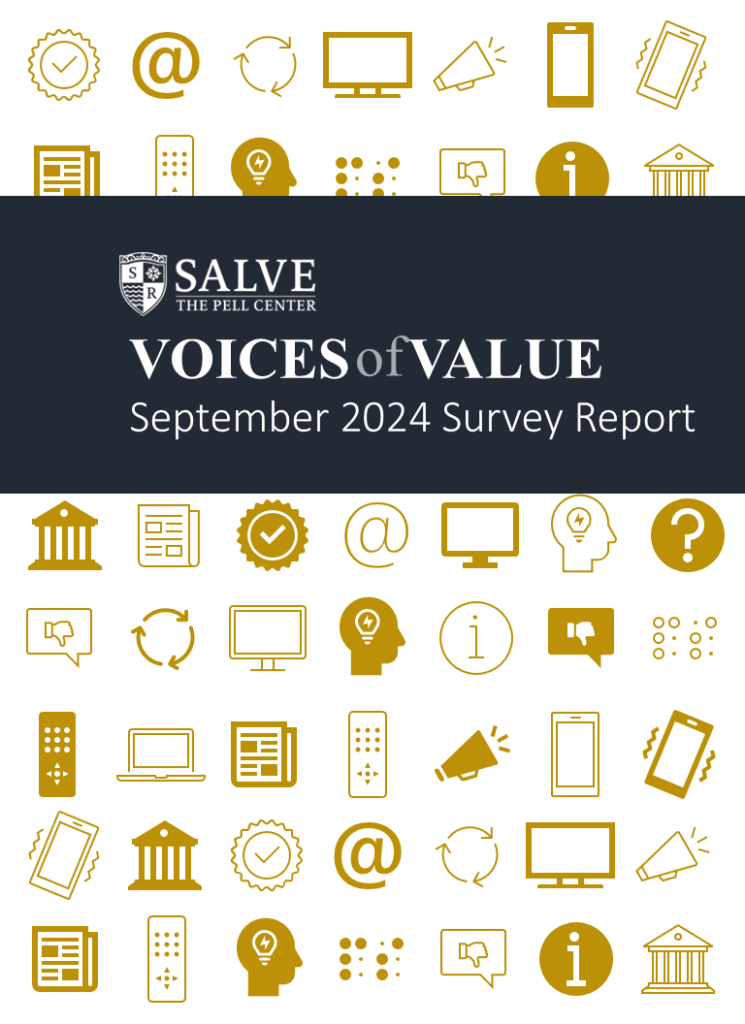Harris Leads Trump by 14-percentage points in New Rhode Island Survey from Pell Center at Salve Regina University
The presidential race in Rhode Island hinges on only a handful of issues.
NEWPORT, R.I.– Rhode Island likely voters favor Vice President Kamala Harris over former President Donald Trump by a 52% to 38% margin with 7% still undecided. Harris substantially outperforms President Joseph Biden’s position in a June Pell Center survey that gave the incumbent only a 7% lead over his challenger.

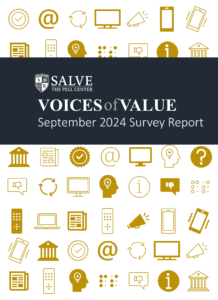
The survey was fielded by Embold Research on behalf of the Pell Center at Salve Regina University between September 16 and September 20, 2024, via the web and SMS messaging. It gathered responses from 876 likely voters in Rhode Island, with a modeled margin of error of 3.5%. Jim Ludes and Katie Sonder directed the survey for the Pell Center.
Harris enjoys strong margins in most measured demographics, but—tracking with national polling—lags behind Trump with men who did not attend any college. In that demographic, she trails Trump by 29 points. In contrast, Harris enjoys a 55% margin among college educated women in Rhode Island.
The presidential race in Rhode Island seems to hinge on only a handful of issues. When asked about the issue most important in determining their vote, 44% of Republicans cited immigration while 35% cited the economy. Democrats are motivated by the health of American democracy (33%) and reproductive rights (24%). Issues like crime, gun control, health care, education, foreign policy, climate change, taxes, and student loan forgiveness barely registered with voters.
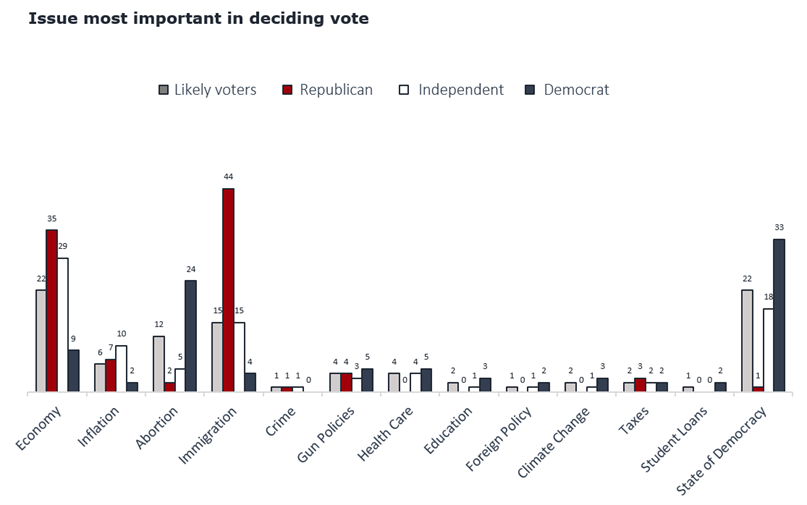
In the race for one of Rhode Island’s seats in the U.S. Senate, incumbent Senator Sheldon Whitehouse leads challenger Patricia Morgan by a margin of 52% to 36% with 11% undecided.

In the first Congressional district race, incumbent Representative Gabe Amo leads his challenger, Allen Waters 56% to 27% with 16% undecided. While in the second Congressional district, incumbent Representative Seth Magaziner leads challenger Steven Corvi by a margin of 50% to 37% with 12% undecided.
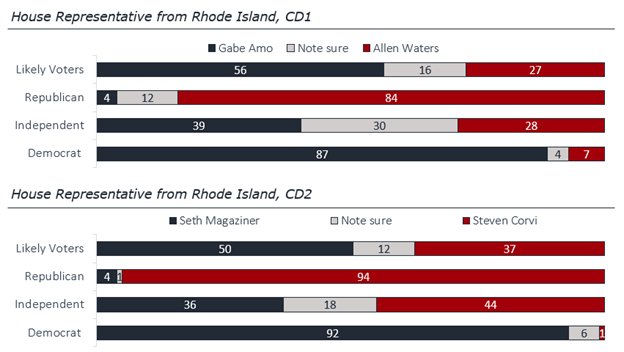
Rhode Island’s federal delegation receives consistently strong job approval ratings with senior Senator Jack Reed leading the field with 60% of likely voters reporting they “strongly” or “somewhat strongly” approve of his performance. Whitehouse (49%), Amo (47%), and Magaziner (42%) all maintain a positive net approval rating (the difference between total approve and disapprove).
Among Rhode Island’s state-wide office holders, the governor and lieutenant governor stand out for their poor job approval ratings. Governor Dan McKee’s rating remains under-water, with only 34% of likely voters offering approval while 56% disapprove. Lieutenant Governor Sabina Matos received approval from 26% of likely voters in the survey while 39% disapproved.
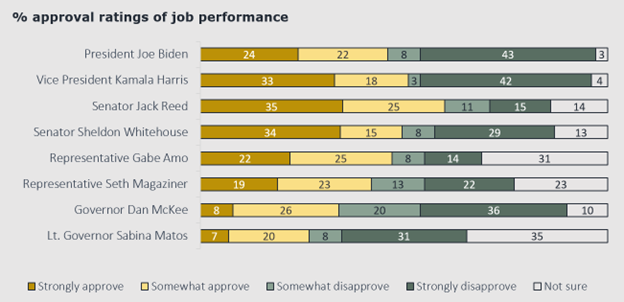
When asked about the overall direction of the state, 41% said the state was on the right track, while 59% said it was headed in the wrong direction. Broken down along party affiliation, the divide becomes obvious with Democrats (69%-31%) the only group likely to see the state heading in the right direction. Republicans are the most pessimistic (5%-95%), but Independent voters are decidedly “wrong track,” as well (28%-72%).
Political Polarization and the 2024 Cycle
Perhaps not surprisingly, 93% of Rhode Island’s likely voters believe the country has become more polarized in the last year. They point to a variety of causes, including disinformation and fake news (51%); partisan media (27%); social media platforms (23%); money in politics (22%); and political leaders and public officials in both parties.
A majority of Rhode Islanders (59%) express concern about the health of American democracy, even while 60% of respondents report trust in the 2024 election to be “fair and accurate.”
The findings about the health of American democracy reflect a partisan divide on the issue with 77% of GOP voters describing “the U.S. system of democracy” as unhealthy, compared to 43% of Democrats who hold the same view.
News Consumption Habits
Rhode Island voters get most of their news about national and local politics from local TV news (43%). The news operations of the major broadcast networks (ABC, CBS, NBC, PBS) are a close second (42%); followed by CNN (26%); Facebook (26%); national newspapers like The Washington Post or Wall Street Journal (25%); MSNBC (24%); and Fox News (23%).
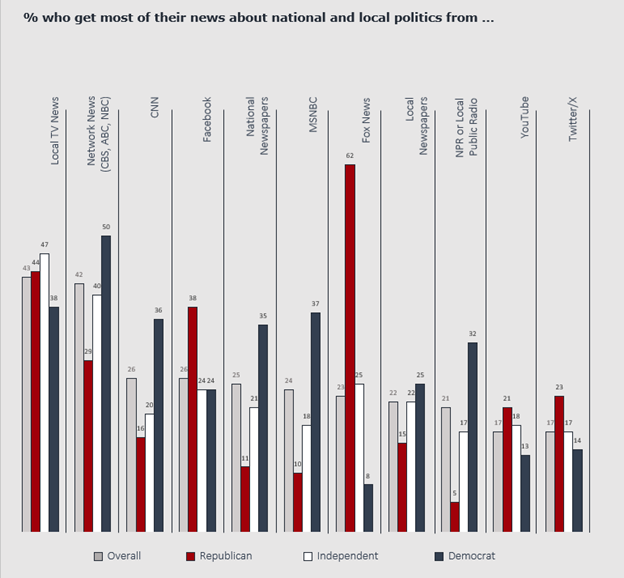
As the election nears, 29% of respondents report avoiding news, and 43% report doing so “sometimes.” The top stories people are trying to avoid are entertainment and celebrity news (45%); national politics (38%); election coverage (38%); the Israel-Hamas war (30%); and the war in Ukraine (28%).
As in other questions, there is a partisan break in what stories people are trying to avoid. For example, among Republicans who report avoiding news, 63% avoid news about climate change; 59% about entertainment and celebrities; and 50% about social justice. Democrats who report avoiding news say they avoid stories about national politics (37%); election coverage (34%); and the Israel-Hamas war (32%).
This survey is part of an initiative called “Voices of Value” designed to use public opinion surveys from the Pell Center at Salve Regina University to understand political dynamics, including political polarization and other threats to the health of American democracy.
Additional Resources:

